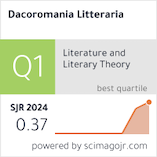MADALINA AGOSTON
THE RECEPTION OF THE GENEVA SCHOOL OF LITERARY CRITICISM.
THE IRONY OF JEAN STAROBINSKI IN THE ROMANIAN TRANSLATIONS
DOI: 10.33993/drl.2022.9.100.114
Author's coordinates: Babeș-Bolyai University, 21 Horea Str., 700506 Cluj-Napoca, Romania.
Email: madalina.agoston@ubbcluj.ro
THE RECEPTION OF THE GENEVA SCHOOL OF LITERARY CRITICISM. THE IRONY OF JEAN STAROBINSKI IN THE ROMANIAN TRANSLATIONS
(Abstract)
Considering that the “official” literary studies discourse of the post-war era in Romania was shaped by Structuralism, I would emphasize the fact that Geneva School of Literary Criticism’s main theoretical directions, coming from the Francophone area, as a recursion to French language contexts, not from Paris this time (as was the case in 19th century and the first half of the 20th century), but from Geneva. The analysis of this model, thus, taken from the West to an East-European space aims to see how, in the case of concept translation – of theoretical and cultural transfer – , translation itself answers to the demands of today’s literary market: how does this transfer take place, from a source-culture to a target-culture, how can we examine it from a transnational theory perspective? The research of esthetical and political issues that the Romanian society (together with the East-European one) has faced in the 70s could be the solution itself. My paper shell therefore focus on analyzing the circulation of critical texts, both in translation and in critical debates and theoretical constructions, in periodical texts, as well as in critical volumes – and the main example for this is the Romanian translation of irony concept at Jean Starobinski.
Keywords: Geneva School of Literary Criticism, translation, post-war literary criticism, melancholy, Jean Starobinski.
RECEPTAREA ȘCOLII DE CRITICĂ LITERARĂ DE LA GENEVA. IRONIA LUI JEAN STAROBINSKI ÎN TRADUCERILE ROMÂNEȘTI
(Rezumat)
Dacă discursul oficial în studiile literare ale perioadei postbelice era cel venit pe filieră structuralistă, cel al criticii de idei/criticii de la Geneva pătrunde din spațiul francofon ca o revenire asupra contextelor de limbă franceză, de data aceasta nu de la Paris (ca în secolul al XIX-lea și prima jumătate a secolului XX), ci de la Geneva. Analizarea modelului de construcție al criticii geneveze, așadar, transportat dintr-un spațiu occidental într-unul est-european își propune să urmărească în ce măsură, în cazul traducerii de concept – al transferului teoretic și cultural –, traducerea însăși răspunde cerințelor pieței literare actuale: cum are loc acest transfer, dinspre cultura-sursă înspre cultura-țintă, dacă interogăm din perspectiva teoriilor transnaționale. Investigarea unor problematici de ordin estetic și politic cu care societatea românească (și est-europeană deopotrivă) s-a confruntat în anii 70 este și soluția la care propunerea de față recurge prin analiza importului de text critic tradus și comentat, fie în revistele culturale ale perioadei, fie în volume – exemplul de la care pornesc în analiză e cel al traducerii conceptului de ironie de la Jean Starobinski.
Cuvinte-cheie: Școala de la Geneva, traducere, critică literară postbelică, melancolie, Jean Starobinski.


